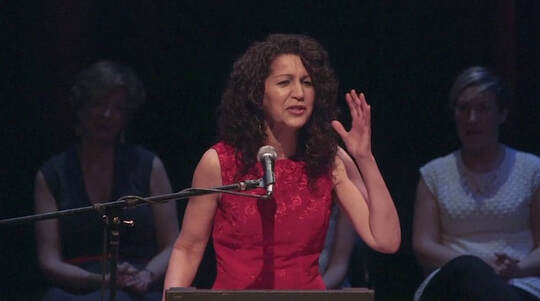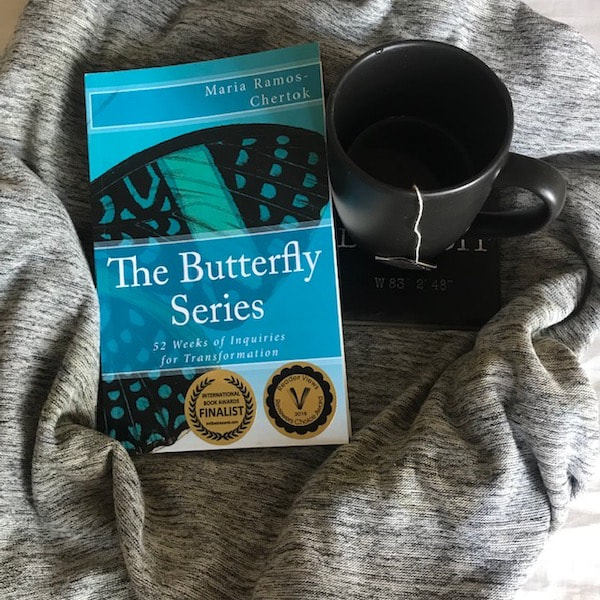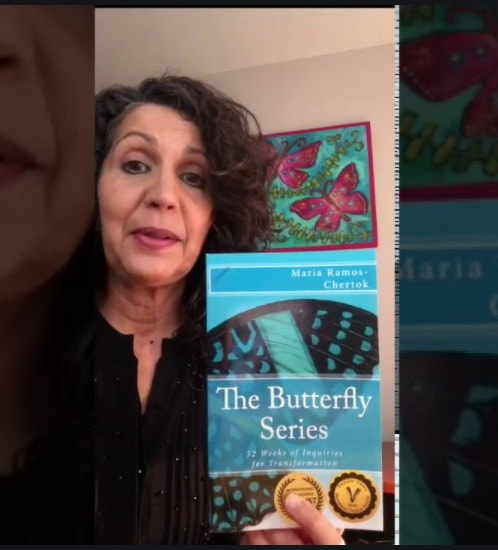|
- Triumph Over Life Transitions & Tap Into Your Creative Side - Not only are taxes and death guarantees in life, change and transformation are as well. In one way or another, we are always evolving, but often encounter particularly pronounced times of a life shift, faced with major decisions to be made. Positive or challenging; intentional or unexpected, if you live long enough, you will experience this ... and hopefully learn and grow as a result. “The Butterfly Series” by Maria Ramos-Chertok addresses those moments, and then some. It is both practical and accessible; creative and inspiring as it easily guides the reader through weekly writing prompts on the journey through change, transition and transformation. Born from an actual hands-on workshop of the same name and developed by Ramos-Chertok, “the series is a writing and creative arts workshop for women who want to explore what’s next” (Ramos-Chertok). She developed it out of her own need. It’s the type of thing she was looking for herself when going though a life transition and facing major decisions. The book, “The Butterfly Series” is set up as 52 thoughts and exercises for self-reflection. It is organized into four sections indicative of the stages of a butterfly- egg, larva, chrysalis, and taking flight. As such the reader is encouraged to journal, create, discuss or process these 52 weekly exercises in whatever way works best for them. On one side of the page/chapter is a thought provoking question, on the other, is a personal anecdote and ideas pertaining to the topic of the week. Although the workshop series is open to men as well as women, it tends to draw a predominately female participation. It is also a diverse group as Ramos-Chertok has made a commitment to herself that 50 per cent of those attending/participating, be women of color in order to move forward with a workshop. She feels that sort of diversity is not only being true to herself, but makes for a richer experience for all those involved. I had a recent opportunity to discuss “The Butterfly Series” book and workshop with Ramos-Chertok. PF: What do you see as the distinctions between change, transition and transformation? MRC: I think that the three words have somewhat collapsed in the modern lexicon. People think they are one and the same, partly because transformation sounds so intriguing. I see them as different. Transition for me is something that happens over a period of time. A transition does include change, but it’s not immediate change, like a changed my clothes. When people are going through life changes, they don’t want to go through the transition because it will be a process. Often it’s a hard process, taking you through a rough spot in your emotional or spiritual journey. In terms of transformation, I was given a meaningful explanation or definition by a former mentor of mine, Robert Gas: When you undergo a transformation, willingly or unwillingly, you never go back to the way you were. You have developed a whole new mindset or behaviors or world view that completely shifts the way you engage with yourself or others. PF: What would you say is key to gearing up for a meaningful transformations or examples of? MRC: I think there are a lot of ways that women, and I’m thinking specifically now of women of color, have internalized racism or sexism that has been apart of their upbringing. As a life coach, one of the things that I do is really try to examine with people I work with, how are you treating yourself and what is that voice inside your head saying? For many, there is a voice that’s not that nice. First, you need to identify that, then having a conversation to determine where that voice come from. An example of a transformation is that negative voice does not get to decide how worthy you are. PF: Where did the idea for the book and workshop come from, and why did you create the butterfly metaphor to develop it? MRC: The workshop I teach came before the book. I had reached a point in my career as an attorney where I had to embrace more creativity. I had always made more use of that linear, logical side of my brain, but the creative part of me was just dying underneath. I created a workshop that meets once a month for six months. Essentially, each session is divided into four parts, corresponding to the stages of a butterfly development. Elements of the workshops include free writing (egg stage), art exercises for the (larva stage), etc. Attendees are encouraged to ask themselves what do they want to pay attention to by the time they return for the next session. For many, it’s about an intention. There is accountability built into the “taking flight” last stage. When I wrote the book, it occurred to me that it makes sense to make the inquiries as four stages of a butterfly’s development. Maria stresses to me and to those who attend her workshop, that they are not creating “to do” lists as that would actually counter productive to the process. It’s more about discovering where to focus your intention(s) to be for the next month. PF: Speaking of life changes and/or transitions, the world is going through one collectively with the Corona virus and its impact. As a life coach, can you expound on how we can best navigate through this time and come out the other side with our wits, intentions and creativity in tact? MRC: One of the things brought up in the book that is hardest for people when going through any sort of change is stillness, to just be without knowing. I have found in all the changes I have gone through in my life, I had to go into a period where I didn’t know what was going to come out on the other side. Those were scary times, but, being willing to sit through the unknown and not try to fix it or have answers, helped me experience what was next in a much more meaningful way. What’s going on now is that the world has to be still and has to deal with the natural trepidation of boredom and stillness. This is a good opportunity to check in with yourself and say, “Okay, how have I been spending my time? Is how I’ve been spending my time meaningful? Are there things I want to do differently now, and are there people that I want to reach out to that maybe need me more?” It’s about taking stock, then taking the next step. PF: What are some of the books/authors who have inspired you? What book or books do you like to recommend? MRC: A nonfiction book that I'm so glad I finally got around to reading is “White Fragility” by Robin DiAngelo. I read it because I want to be able to refer it specifically to white people who want to (and should) enter the race conversation. PF: What’s on your nightstand? MRC: I just finished “Girl, Woman, Other” by Bernardine Evaristo. I loved it! I felt that she was able to successfully capture an inter-generational tale of connectedness and cause effect. I’m now listening to and enjoying “City of Girls” by Elizabeth Gilbert. Also, a friend of mine, Ruth Bahar, like me is Latina and Jewish, has a book called “Lucky Broken Girl” that I really appreciated. She has a new soon-to-be-released book called “Letters From Cuba” that I’m so looking forward to reading. Maria Ramos-Chertok lives in the San Francisco Bay Area with her family. She has over twenty years of experience working with change and transition as an organizational development consultant, coach and trainer. She is the founder and facilitator of The Butterfly Series. For more information about the Series, go to www.thebutterflyseries.com
0 Comments
Leave a Reply. |
Archives
January 2024
Categories |




 RSS Feed
RSS Feed